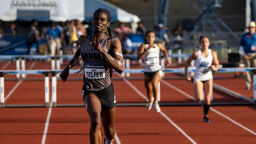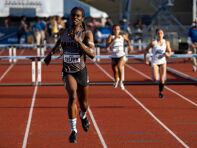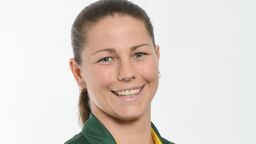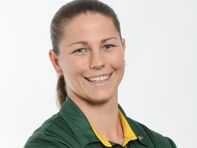When is a legacy safe?
It’s the question that lingered over the Australian Open for the last couple of weeks as Margaret Court Arena sat in the middle of a controversy around the most decorated tennis player of all time. That person — Margaret Court — also happens to be against same-sex marriage, likens gay people to Hitler and says homosexuality is a curable offense.
Late last year, tennis commentator Mary Carillo set out to find the answer to that question about legacy. She sought to understand Court, and whether her name should be stripped from the arena due to her positions about the LGBT community.
In a new segment of HBO Real Sports with Bryant Gumbel airing Jan. 30, Carillo sat down with the three most decorated Grand Slam tennis players of all time — Court and her two lesbian counterparts, Billie Jean King and Martina Navratilova — to better understand the rift that has developed between these women and the controversy surrounding Margaret Court Arena.
The arena, opened in 1988, was renamed Margaret Court Arena in 2003. One of the people then championing the new name was King, the out lesbian whose name now adorns the U.S. Open tennis venue. While King and Court have been both rivals and friends over the years, King now says she would refuse to play in Margaret Court Arena, and she hopes other tennis players will do that very thing.
“I hope some of them, if they have any sensitivity to the world around them, and as a human being, I would hope they don’t play on that court,” King told Carillo.
Yet in 2003, even as King was requesting Court’s name be added to the arena, we knew this great Australian champion was anti-gay. In 1990, as Navratilova won her ninth Wimbledon, Court said that Navratilova was not a role model because she’s gay.
That didn’t stop King from wanting Court’s place in history honored.
King now says Court’s language — likening gay people to communists and the devil — has just gone too far. King was fine adding the anti-gay Court’s name to an arena as long as Court wasn’t too vocal about her views. Now that she’s fought against same-sex marriage and other issues, she has passed a threshold that King isn’t comfortable with.
King’s embrace of Court in 2003 despite her vitriolic language about gay people underscores the complexities of decisions about whom to honor with names of buildings and streets, and what can suddenly disqualify a great champion. While many in the LGBT community are embracing King’s decision, it’s one she has only come to recently.
It’s a dilemma that Carillo herself struggles with. Carillo told Outsports that she identifies as a member of the LGBT community and takes issue with Court’s position and language. Yet Carillo understands the importance of having a woman’s name on a building. It just doesn’t happen that often.
“No one will ever touch her grand slam record,” Carillo said of Court. And she’s right. With 64 Grand Slam titles — singles and doubles — she has five more than Navratilova in second, and 24 more than King and Serena Williams in third. The closest man is Roy Emerson, whose 28 titles aren’t even half of Court’s.
“There is no denying that Margaret Court is one of the greatest tennis players, men or women,” Carillo said. “A lot of people don’t know how truly great of a tennis player Margaret Court was.”
A lot of people also don’t realize how positively Court has affected the lives of countless people in Perth, Australia. Carillo spent several days with Court late last year, visiting her ministry. Among the many good things Court has overseen in her role as pastor is providing 24 tons of food to needy families every week, feeding thousands of people.
In Carillo’s HBO Real Sports segment, people at the church say that they would literally be dead if it weren’t for Court.
“She does a hell of a lot of good, and there’s no denying any of that,” Carillos said. “She doesn’t come across as strident. She comes across as kind.”
Court herself feels she welcomes all people. With the same breath that she accuses gay people of using the same tactics as Hitler, she says she isn’t trying to change gay people (though she’s there for them if they want to change), and that everyone is welcome in her ministry.
“I feel I do [embrace everyone] because we have Muslim people come into our community services, we have all different backgrounds,” Court told Carillo. “Even the flowers I have in my office are done by gay people. They’ve been doing it for four years, so I feel I do.”
Court is no cookie-cutter champion. She is her own woman, a strong woman with strong beliefs. Her complexities, and the complicated nature of a sports legend’s legacy suddenly showing some tarnish, all come out powerfully in the Real Sports segment.
“This is not an agenda piece at all,” Carillo said. “I struggle with this issue of when a legacy is safe. And I honestly think people will have to think hard about it at the end.
“I’ve always told my kids that people are not just one thing. They aren’t just gay or straight, male or female, black or white. It’s important to me to tell people how much good work Margaret Court does. she’s following her heart.”
For now, that’s enough to keep her name on Margaret Court Arena. How hard will people like King and Navratilova push to change that? The end of this story is not yet written.
You can catch Mary Carillo’s report on Margaret Court, The Believer, on HBO Real Sports with Bryant Gumbel this Tuesday, Jan. 30, at 10pmET/PT.







































